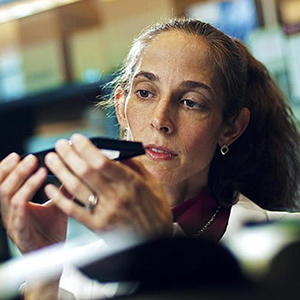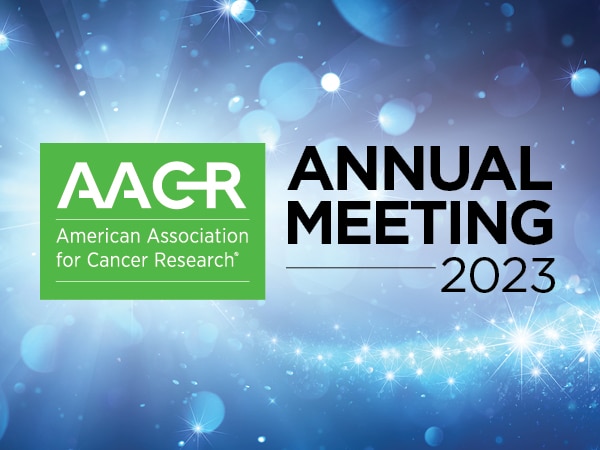Q&A With Kimberly Stegmaier, MD, on Pediatric Cancer Research
Later today, about 200 researchers, united in their efforts to change the fact that cancer is the leading cause of disease-related death among children in the United States, will convene in Fort Lauderdale, Florida, for a four-day conference on Advances in Pediatric Cancer Research organized by the American Association for Cancer Research (AACR).
We were excited to have the opportunity to ask one of the co-chairs of this meeting, Kimberly Stegmaier, MD, co-director of the pediatric hematologic malignancy program and associate professor of pediatrics at Dana-Farber Cancer Institute and Boston Children’s Hospital, to share her thoughts about the most exciting areas of research that will be discussed at the meeting and what to watch for in the future.

Nearly 200 researchers will convene in Fort Lauderdale starting today for a four-day conference on Advances in Pediatric Cancer Research.
The meeting is titled, “Advances in Pediatric Cancer Research: From Mechanisms and Models to Treatment and Survivorship.” What is the significance of “From Mechanisms and Models to Treatment and Survivorship,” and how does it reflect the status of the field?
This is one of the only meetings that brings together key opinion leaders in the pediatric research community across the spectrum of disciplines, from basic to translational to clinical research. This infuses the meeting with the power of synergy because everyone in the room has a unique perspective on how to ultimately improve outcomes for patients. The title of the meeting was designed to capture the breadth of topics to be discussed and reflects our understanding that the best way to achieve meaningful advances for patients is by integrating all aspects of pediatric cancer research.

Kimberly Stegmaier, MD, co-director of the pediatric hematologic malignancy program and associate professor of pediatrics at Dana-Farber Cancer Institute and Boston Children’s Hospital.
What areas of basic pediatric cancer research will be discussed at the meeting?
There are exciting advances being made in a number of areas of basic pediatric cancer research and these topics will be a focus of the meeting. With the meeting program being so diverse there is something for everyone to be excited about.
In recent years, we have seen the emergence of new technologies that are transforming the way in which we do research, not only pediatric cancer research, but also research into cancers that typically affect adults. These technologies are revealing new insights into the mechanisms of pediatric cancers and we are much closer to understanding these diseases at the basic level than ever before.
The use of new technologies to characterize the genomic and epigenomic landscapes of a number of pediatric cancers has been particularly informative in recent years and continues to identify new potential therapeutic targets. Lessons learned from one the longest running of pediatric cancer genome projects, the St. Jude Children’s Research Hospital–Washington University Pediatric Cancer Genome Project, will be the focus of the keynote lecture given by James R. Downing, MD, from St. Jude Children’s Research Hospital in Memphis. There are also exciting sessions specifically dedicated to pediatric cancer genomics and epigenomics.
Some of the most exciting areas of clinical pediatric cancer research, which we will hear a lot about at the meeting, are the application of genomics in the clinic, epigenetics, and immunotherapy.
New technologies are also allowing us to systematically manipulate genes (knock them out, turn them on, edit them) to better understand an individual gene’s mechanistic role in cancer. In this way, we can more rapidly study interesting genes that emerge from cancer genome sequencing projects. The application of these new functional genomic technologies is one area that will be presented in the session on “Novel Strategies for Modeling Cancer,” which should stimulate a lot of discussion.
Technology advances have also opened new avenues of research aimed at detecting and studying small numbers of cells and DNA isolated from the blood of patients. While this has many applications in clinical research, it is also allowing us to gain new mechanistic insight into disease progression and drug resistance.
Which clinical research innovations being presented at the meeting are you most excited about and think will have an impact in the clinic?
Some of the most exciting areas of clinical pediatric cancer research, which we will hear a lot about at the meeting, are the application of genomics in the clinic, epigenetics, and immunotherapy.
Integrating genomic information into the care of children with cancer is not an entirely new concept. However, we are only just beginning to incorporate deep genomic data into patient care, and we will hear about multiple efforts to do this in the session on “Applied and Clinical Genomics.” Yael P. Mosse, MD, from The Children’s Hospital of Philadelphia, will talk about how this information can be used to personalize treatment for neuroblastoma; Mignon L. Loh, MD, from the University of California, San Francisco, will focus her presentation on acute lymphoblastic leukemia (ALL); and Paul Northcott, PhD, from St. Jude Children’s Research Hospital, will focus on the brain tumor medulloblastoma.
Thanks to basic research, we are beginning to learn that many pediatric cancers are not just a result of genetic alterations, they also have an epigenetic component. A number of speakers will discuss new epigenetic targets and approaches to modulating them. Identifying ways to leverage emerging epigenetic information for patient benefit is something that many researchers are actively investigating, and this is an area to watch in the coming months and years.
Collaboration amongst the pediatric research community has really helped address the challenge of conducting clinical trials for diseases with few patients, but with so many candidate therapeutics, it is still a challenge to decide which should be evaluated first.
In recent years, we have also seen immunotherapy emerge as a powerful treatment for a number of types of cancer. In pediatric cancer, however, successes have been largely limited to CAR T-cell therapy and antibody-based approaches for B cell malignancies such as ALL. In the session on “Immunotherapy,” we will hear updates on these approaches and on efforts to use CAR T-cell therapy and other adoptive cell therapies for the treatment of pediatric solid tumors.
Another area of clinical/translational research that is worth noting is the use of new technologies to survey the peripheral blood of pediatric patients with cancer for circulating tumor cells or tumor DNA. These are early days for this technology, but it is showing promise for detecting minimal residual disease (MRD) in patients with solid tumors. MRD is already a known indicator of poor outcome in children with leukemia. If we were also able to apply this technology to solid tumors, it could transform clinical care by enabling a child’s cancer to be monitored without the need for invasive tumor biopsies.
What do you believe are the biggest challenges to advancing pediatric cancer research?
Pediatric cancer is, thankfully, a rare disease—just over 10,000 U.S. children ages 0 to 14 are expected to receive a cancer diagnosis in 2015. However, the relatively small numbers of patients with each type of childhood cancer makes it a challenge to conduct discovery research. It also makes it harder to perform clinical trials. Collaboration amongst the pediatric research community has really helped address the challenge of conducting clinical trials for diseases with few patients, but with so many candidate therapeutics, it is still a challenge to decide which should be evaluated first.
Another challenge that is facing the entire cancer research community is that the budget for the National Institutes of Health has been squeezed for a while now. Research costs money and we need adequate funding to make these critical advances in the treatment of children with cancer. There are a lot of generous foundations, but this funding does not fully make up for the lack of federal funds, which is affecting our ability to recruit the brightest minds to the pediatric cancer research field, and, ultimately, to reach the goal of curing all children with cancer.
Kimberly Stegmaier, MD, is a member of the AACR’s Pediatric Cancer Working Group Steering Committee. In 2009, she received a Stand Up To Cancer (SU2C) Innovative Research Grant to study modulating transcription factor abnormalities in pediatric cancer; the AACR is the Scientific Partner of SU2C.



